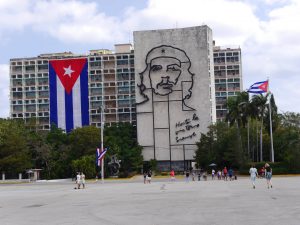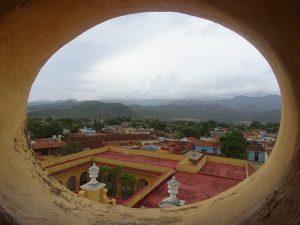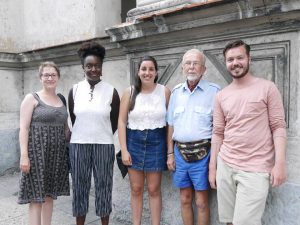The following article was written by MA International Development student Ines Moreno:
Every year the University of Kent offers four or five post-graduate students a scholarship to travel to Cuba for three weeks during the Easter break. The award includes flights to Cuba and a maintenance grant for accommodation and subsistence travelling. The scholarship’s aim is for Kent students to explore the beautiful Caribbean island; its vibrant culture, beautiful landscapes and colonial cities as well as mingle with the locals.
I was very fortunate to have been granted this amazing opportunity. During our stay in Cuba we travelled around the island, visiting six cities and villages. We started off at Viñales, a small very touristy town 3 hours west of Havana. Viñales is a beautiful small town, tourist friendly and vibrant. Viñales is where a lot of the tobacco is produced in Cuba so the horse ride across the tobacco plantations during sunset was amazing. Our next stop was Playa Larga (Bay of Pigs) which was a radical change from Viñales, as it’s not a touristy town and we got a better sense of the ‘real Cuba’. Trinidad and Santa Clara were our next stops, two beautiful colonial cities. Trinidad is well known for its very well kept colonial architecture and lively lifestyle. Santa Clara is a large student town, it’s known for its relevance as a strategic location in the War of Independence against Americans led by Che Guevara. The Cubans are very proud of their history and hence, Che Guevara’s memorial and museum is a very big tourist attraction. Our last stop before spending a week in Havana was Varadero, known to have the best beaches in Cuba. The sunsets and parties on the beach were the highlight of our stay in Varadero. Lastly, we decided to stay in Havana for an entire week given the amount of activities and sightseeing it requires. Havana is an absolute must. It’s decadent and yet very charming, it’s noisy at all times, from the 50’s colourful cars and music playing on the streets. It’s a vibrant city, with an extraordinary nightlife, historical and political relevance and culturally very rich. Throughout the three weeks we were hosted at ‘Casas Particulares’ local houses that rent out rooms for tourists. This is definitely the best to travel in Cuba as you get a much better sense of the lifestyle, culture and norms.
Our group was formed of four people coming from different disciplines: Computer Science, English Literature, Hispanic Studies and International Relations. Naturally, we all had different plans for pursuing our individual research. As a post-graduate in the politics field and given the historical and political importance of Cuba in International Relations, it has been an amazing experience to see and first-hand experience the lives and culture of Cubans. Travelling to the island after the Cuban thaw, the diplomatic rapprochement between the American and Cuban governments, is a very interesting experience in terms of seeing the immediate effects of such diplomatic agreement on the Cuban economy and its citizens.
Thank you very much to the University of Kent and the donor for granting me this amazing opportunity. I would definitely encourage BSIS students who have an academic interest in the island to apply to this amazing scholarship and hopefully explore Cuba!



